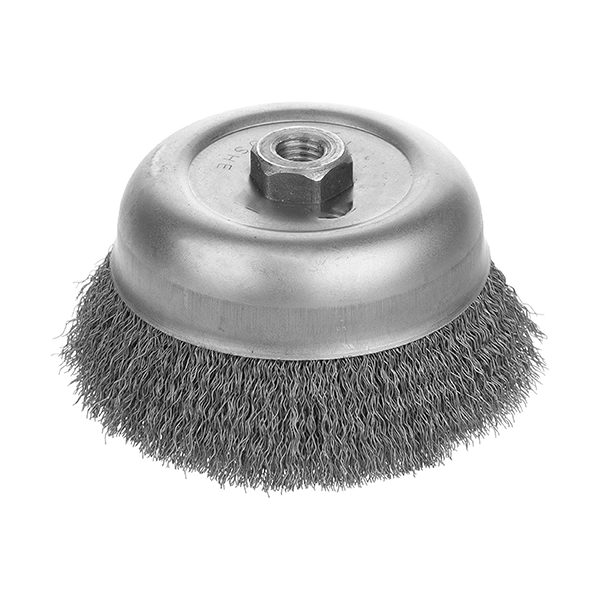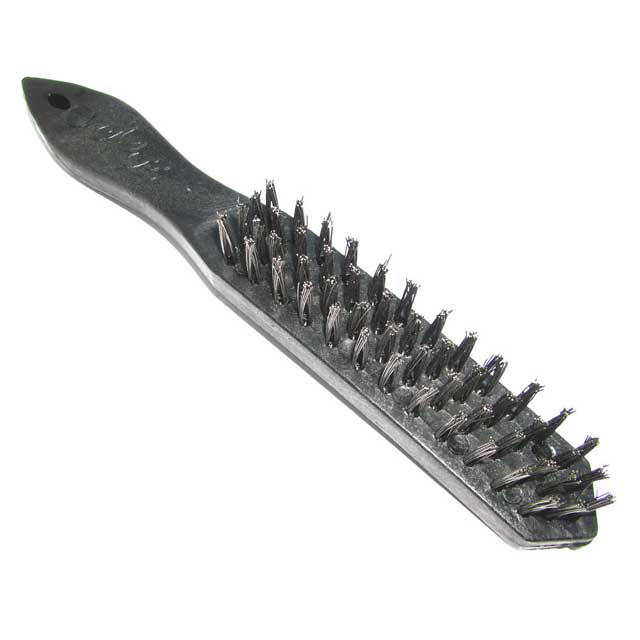
Wire brushes are versatile tools used in various industries and DIY projects for surface preparation, cleaning, and finishing. These brushes consist of bristles made of metal wires that are securely fastened to a handle or backing material. The aggressive nature of the wire bristles makes them ideal for removing rust, scale, paint, and other unwanted materials from metal, wood, and other surfaces. Understanding the different types, materials, and applications of wire brushes is crucial for selecting the right tool for the job and ensuring safe and effective use.
Wire brushes come in various shapes and sizes, each designed for specific tasks. Here are some common types:
Handheld Wire Brushes: These are the most common type and are used for manual cleaning and surface preparation. They typically have a wooden or plastic handle for a comfortable grip.

Cup Brushes: These are designed for use with angle grinders and are ideal for cleaning large, flat surfaces. They have a cup-shaped head with wire bristles extending outward.

Wheel Brushes: These are also used with power tools, such as bench grinders, and are suitable for cleaning and deburring edges and corners. They have a wheel-shaped head with wire bristles around the perimeter.

End Brushes: These are small, cylindrical brushes used for cleaning hard-to-reach areas, such as inside pipes and tubes. They are often used with drills or rotary tools.

Crimped Wire Brushes: The wires are crimped to increase flexibility and reduce aggressiveness. Suitable for lighter cleaning and polishing tasks.
Knotted Wire Brushes: Wires are twisted or knotted together for aggressive cleaning and heavy-duty material removal.
The materials used in wire brushes vary depending on the intended application. Here are some common materials:
Steel Wire: This is the most common material for wire brushes. Steel wire is strong and durable, making it suitable for general-purpose cleaning and surface preparation.
Stainless Steel Wire: Stainless steel wire is corrosion-resistant, making it ideal for use in wet or humid environments. It is also suitable for cleaning stainless steel and aluminum surfaces.
Brass Wire: Brass wire is softer than steel and stainless steel, making it suitable for cleaning delicate surfaces, such as brass, copper, and aluminum. It also produces minimal sparking. Pay attention, Brass Wire is excellent for preventing rust formation.
Nylon Wire: Abrasive nylon filaments are infused with abrasive particles. Useful for polishing and light deburring, especially on softer materials.
Carbon Steel Wire:High carbon steel provides excellent abrasion resistance and is used in aggressive cleaning applications.
Wire brushes have a wide range of applications in various industries and DIY projects. Here are some common applications:
Rust Removal: Wire brushes are effective at removing rust from metal surfaces, such as tools, equipment, and automotive parts.
Scale Removal: They can also be used to remove scale from metal surfaces, such as welds and pipelines.
Paint Removal: Wire brushes can be used to remove old or peeling paint from metal, wood, and other surfaces.
Surface Preparation: They are often used to prepare surfaces for painting, welding, or other finishing processes.
Cleaning: Wire brushes can be used to clean various surfaces, such as concrete, brick, and stone.
Deburring: They are also used to remove burrs from metal edges and corners.
Welding: Cleaning welds before and after to ensure integrity.
Automotive applications: Removing carbon deposits, prepping surfaces for painting and restoring parts.
Woodworking: Texturing wood and cleaning saw blades.
Metalworking: Deburring, cleaning and preparing for welding or painting.
Selecting the right wire brush for the job is crucial for achieving the desired results and ensuring safety. Here are some factors to consider:
Material of the Surface: Choose a wire brush made of a material that is compatible with the surface you are cleaning or preparing. Using a wire brush that is too aggressive can damage the surface.
Type of Contaminant: Consider the type of contaminant you are trying to remove. A more aggressive wire brush may be necessary for removing heavy rust or scale, while a softer brush may be suitable for removing light dirt or paint.
Size and Shape: Choose a wire brush that is the appropriate size and shape for the task. A small, handheld brush may be suitable for cleaning small areas, while a larger cup brush may be necessary for cleaning large, flat surfaces.
Power Tool Compatibility: If you plan to use a wire brush with a power tool, make sure it is compatible with the tool.
Bristle Configuration: Crimped wire is more flexible and causes less aggressive abrasion. Knotted wire brushes are best for aggressive material removal.
Using wire brushes can be hazardous if proper safety precautions are not taken. Here are some safety tips to keep in mind:
Wear Safety Glasses: Always wear safety glasses to protect your eyes from flying debris.
Wear Gloves: Wear gloves to protect your hands from cuts and abrasions.
Wear a Dust Mask: Wear a dust mask to protect your lungs from dust and other airborne particles.
Work in a Well-Ventilated Area: Work in a well-ventilated area to avoid inhaling harmful fumes or dust.
Inspect the Brush Before Use: Inspect the brush before each use for loose or damaged bristles. Replace the brush if necessary.
Use the Correct Speed: When using a wire brush with a power tool, use the correct speed. Too high of a speed can cause the bristles to break and fly off.
Apply Light Pressure: Apply light pressure when using a wire brush. Too much pressure can damage the surface and cause the bristles to break.
Keep Away From Children: Store wire brushes out of reach of children.
Proper maintenance and care can extend the life of your wire brushes. Here are some tips:
Clean the Brush After Each Use: Clean the brush after each use to remove debris and contaminants.
Store the Brush in a Dry Place: Store the brush in a dry place to prevent rust and corrosion.
Replace Worn Bristles: Replace the brush when the bristles become worn or damaged.
Use a Wire Brush Cleaner: Use a wire brush cleaner to remove stubborn debris and contaminants.
Wire brushes are essential tools for surface preparation, cleaning, and finishing. By understanding the different types, materials, applications, and safety precautions, you can select the right wire brush for the job and use it safely and effectively. Regular maintenance and care will help to extend the life of your wire brushes and ensure optimal performance.
For more information on abrasive solutions, check out سنباده رولی تهران پولیش and پرداخت کاری پولیش تهران.



